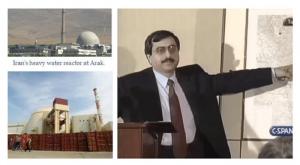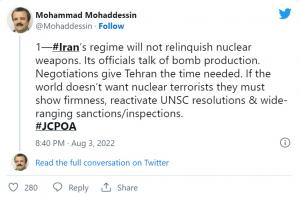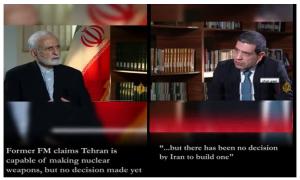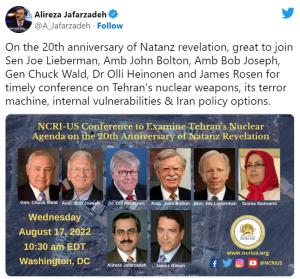(Video) Iran’s nuclear weapons drive continues 20 years after NCRI’s historic revelations

Twenty years ago, the Iranian opposition coalition National Council of Resistance of Iran (NCRI) unveiled the Iranian regime’s clandestine nuclear weapons program through revelations of two secret nuclear sites at Natanz and Arak in central Iran.

Unfortunately, despite the NCRI’s decades-long revelations about the mullahs’ pursuit of nuclear weapons, the West’s appeasement policy has allowed Tehran to advance its nuclear weapons program without accountability.
![In an interview, former MP Ali Motahari admitted Tehran seeks nuclear weapons “Since we started nuclear activities, our goal was building bombs and deterrence power,” Motahari said “But we couldn’t keep it secret and [MEK] revealed our secret reports,”](https://img.einpresswire.com/medium/340932/16-8-2022-arak-4.jpeg)
In an interview, former MP Ali Motahari admitted Tehran seeks nuclear weapons “Since we started nuclear activities, our goal was building bombs and deterrence power,” Motahari said “But we couldn’t keep it secret and [MEK] revealed our secret reports,”
In an interview, former MP Ali Motahari admitted Tehran seeks nuclear weapons“Since we started nuclear activities, our goal was building bombs to spread fear."
Only afterward did the world begin to realize the depth of Tehran’s lies about its claimed peaceful nuclear program, and to this day the debate continues.
Unfortunately, despite the NCRI’s decades-long revelations about the mullahs’ pursuit of nuclear weapons, the West’s appeasement policy has allowed Tehran to advance its nuclear weapons program without accountability.
For over three decades, the NCRI, and its cornerstone member, the People’s Mojahedin Organization of Iran (PMOI/MEK), have been going the distance to uncover and raise awareness about the regime’s illicit nuclear activities.
The PMOI/MEK’s well-established social network inside Iran has penetrated some of the regime’s most secretive enterprises, going through the dangerous and painstaking tasks of unearthing top-secret information about the regime’s illicit nuclear weapons program that has triggered global action.
Despite it being crystal clear that Tehran is seeking to obtain nuclear weapons to guarantee its survival, various U.S. administrations, the European Union, and governments across Europe have long chosen the highly flawed and failed policy of appeasement to supposedly contain the mullahs’ regime.
Quite astonishing is the fact that while describing the Iranian regime as the world’s leading state sponsor of terrorism, these governments and political establishments also argue that such a regime can be contained and trusted when it comes to their highly controversial nuclear [weapons] program.
And how has the regime responded to a seemingly endless cat-and-mouse game of nuclear talks?
“There has been relative progress in the Vienna talks. But the progress has not fully met the legal demands of Iran . Serious consultations were made at the highest levels in Tehran and are yet underway. An agreement is possible in the very near future if Iran’s red lines are observed,” said the spokesperson of the Iranian regime’s Foreign Ministry on Monday.
This comes as the EU has been saying a “final text” is on the table and is seeking answers on this latest proposal from Washington and Tehran.
While the West is looking to obtain a nuclear agreement with the Iranian regime apparently at all costs, regime officials have been crystal clear about Tehran’s intention to obtain nuclear weapons.
On November 27, 2021, Fereydoun Abbasi, a parliament deputy and the former head of the regime’s Atomic Energy Organization, acknowledged in an interview with state media that Mohsen Fakhrizadeh, the assassinated former head of the regime’s nuclear weapons establishment, had created a system to obtain nuclear weapons.
On July 17, former Iranian foreign minister Kamal Kharrazi, now a senior adviser to Iranian regime Supreme Leader Ali Khamenei, boasted that the Iranian regime has become a nuclear threshold country. “We have the technical capability to produce a nuclear bomb,” he specifically said.
Less than 24 hours later, Mohammad Javad Larijani, another senior adviser to Khamenei, said: “If we ever decide to build a nuclear bomb, no one can stop us!”
Seeing no firm response or action from the West, one week later former Iranian regime diplomat Amir Mousavi said Tehran is technically capable of producing a nuclear bomb. There is pressure from inside Iran and from the region to change Khamenei’s fatwa banning nuclear weapons, he added.
Tehran will continue its boasting and its drive to obtain nuclear weapons as long as there is no firm policy seen from the international community. And signs indicate the West has yet to learn its lesson.
“Europe’s proposal to resuscitate Tehran’s nuclear deal with world powers would blunt American sanctions against Iran’s Revolutionary Guards and pave the way for Tehran to avoid further scrutiny of suspected atomic sites,” according to excerpts of the EU draft seen by Politico.
Matters get worse when it comes to more details about the concessions proposed by the U.S. administration to the mullahs’ regime in the nuclear deal on the table.
“Under the deal, Iran gets a financial package worth up to $275 billion in the first year and as much as $800 billion over the next five. With a trillion dollars available by 2030 for Iran’s missile program, sponsorship of terrorism, and Revolutionary Guard, the agreement enables Tehran to set a dozen more fires around the Middle East that force a US response to defend American citizens, embassies, and allies. And in the end, without demanding a full accounting of Iran’s nuclear activities or destroying a single centrifuge, the deal’s expiration dates all but guarantee Iran will still cross the nuclear threshold at a future time of its choosing,” writes Richard Goldberg, a senior adviser at the Foundation for Defense of Democracies.
It is quite obvious that under such conditions Tehran will be even more inclined to keep various aspects of its clandestine effort to obtain nuclear weapons.
“Iran’s regime will not relinquish nuclear weapons. Its officials talk of bomb production. Negotiations give Tehran the time needed. If the world doesn’t want nuclear terrorists they must show firmness, reactivate UN Security Council resolutions, and wide-ranging sanctions/inspections,” tweeted Mohammad Mohaddessin, Chairman of the NCRI Foreign Affairs Commission.
“Talks were not constructive with Hitler, nor will they be with Tehran. This is against international peace and security. Twenty years ago, the NCRI unveiled Iran’s Natanz and Arak sites. Instead of sanctions and punishment, the West chose talks and major concessions. Big mistake! If a firm policy was adopted Tehran would never be so close to the bomb. The world should not repeat the same mistakes,” he added.
The NCRI-US Representative Office will be holding a conference at 10:30 am on Wednesday, August 17, in Washington, DC, hosting a panel of leading experts to discuss Tehran’s nuclear weapons, its terror machine, internal vulnerabilities, and Iran policy options. The speakers will include Sen.
Joe Lieberman and Amb. John Bolton, Amb. Robert Joseph, Gen. Chuck Wald (ret), Dr. Olli Heinonen, former deputy director-general of the International Atomic Energy Agency, and James Rosen, an American journalist and TV correspondent.
Shahin Gobadi
NCRI
+33 6 61 65 32 31
email us here
In an interview, former MP Ali Motahari admitted Tehran seeks nuclear weapons“Since we started nuclear activities, our goal was building bombs.
Legal Disclaimer:
EIN Presswire provides this news content "as is" without warranty of any kind. We do not accept any responsibility or liability for the accuracy, content, images, videos, licenses, completeness, legality, or reliability of the information contained in this article. If you have any complaints or copyright issues related to this article, kindly contact the author above.


